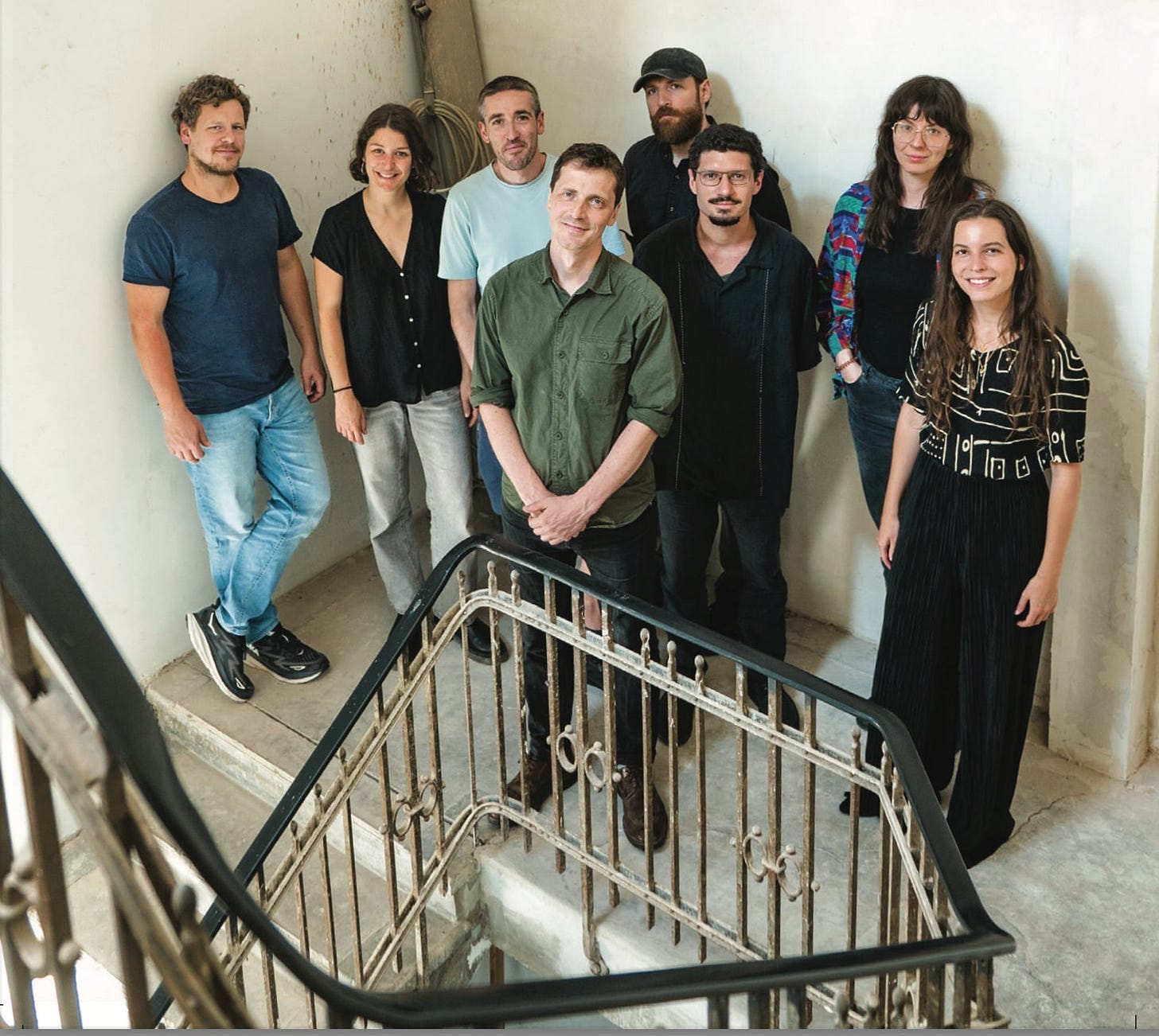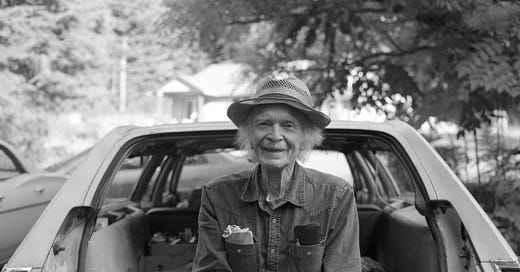Remembering Michael Hurley, Not a Mere Folksinger
I first heard Michael Hurley when I was working at Dr. Wax Records in Chicago, in 1988 or 1989, dropping the needle blind on his then-new album Watertower. On first listen his song “The Revenant” burned its way into my brain, and it’s never let go—it remains one of my all-time favorites. Like many of his best songs, it elides any given genre, but casts its mysterious power and magnetism through his fragile, intimate voice and a melody that feels utterly eternal in its haunting elegance, perfect considering the vampiric theme of its lyrics—check it out below. Soon after I fell in love with Have Moicy!, his classic 1976 collaboration with the Holy Modal Rounders and Jeffrey Fredrick & the Clamtones. Those two recordings launched my unending adoration for Hurley. I was surprised and shocked to see notices his death, at age 83, pop up online last week, since I knew he had just performed at Big Ears—where I last saw him, in 2017—but as reported in an obituary for NPR by Grayson Currin, the singer had been gravely ill, but soldiered on through the weekend, even performing the Monday after the festival in Asheville, North Carolina. He flew home to Portland, Oregon on Tuesday and died that evening.
There’s so much to say about Hurley as musician, painter, and character, but for a deep immersion in what he was all about I’d point you to this exhaustive story by lifetime advocate Byron Coley, published in Arthur Magazine in 2013. Most of what I’ve seen since his death has celebrated him as the father of freak folk, a mantle that makes a certain degree of sense, but which also reduces him to an eccentric caricature. For sure, Hurley was wildly peculiar, ornery, and deeply contrarian, and his utter ambivalence if not revulsion for the conventions of the music business remain a beacon of resistance, independence, and creativity. Buried in his lyrics was a crazy fever-dream weirdness. His skepticism was legion, and from what I know he kept his distance from trends, cliques, and movements, trusting his own peculiar instincts. He made his first album for Folkways in 1964, and when he toured he played solo, accompanying himself on electric guitar, which, I guess, is why people considered him a folksinger.
But to me Hurley was a genuine avatar of American music, a sui generis amalgam of pop, jazz, blues, and folk articulated through a voice that was all his own. He didn’t compartmentalize his interests, but rather, he let them bleed into one another in whatever way made sense. In that way he was akin to Bob Dylan—both deep students of Americana—but Hurley wasn’t remotely interested in participating in the music business. I’ll never forget one performance in Chicago in the early 90s. Hurley was not in a good mood, and he quickly abandoned any sense of a conventional guitar set, instead moving to piano and spending the evening playing boogie-woogie, pop standards, and various covers. He had no time for cultivating a persona beyond his own eccentric self, he had no interest in engaging with the media, or worrying about shifting paradigms. He loved music, and he spent his life practicing a craft that totally eschewed the rules. He drew from this or that tradition to suit the needs of whatever song he was immersed in.
In the Coley story he recounts how a potential mid-60s deal with ESP-Disk—which had already released records by the Holy Modal Rounders—failed when label head Bernard Stollman couldn’t cotton to the voice trumpet solo included on the demo, a technique made famous by the Mills Brothers beginning in the late 1920s. I caught Hurley whenever he played in Chicago, which wasn’t very often, and I had the opportunity to interview him twice—in 1996 when the superb Wolfways collection was released in the US and again in 2021 when he dropped his wonderful The Time of the Foxgloves for No Quarter. In each conversation Hurley was initially reticent, if not downright uncooperative, before he seemed to relax and began regaling me with his unparalleled wit and storytelling abilities. He refused to take himself too seriously, and his sense of humor—sometimes droll, sometimes goofy—could undercut the otherworldly beauty, mystery, and heft of his greatest tunes, of which there were many. There’s a reason why so many folks have covered his songs.
I’m deeply saddened by his death, but at the same time I find poetic beauty in Hurley’s passing. He continued to play his music right until the end. Mike Quinn, the Hurley fan who released The Time of the Foxgloves was in touch with the singer in recent weeks, putting the finishing touches on what will be Hurley’s final studio album, Broken Homes and Gardens, due this summer. “I had been speaking to him regularly the past few weeks,” Quinn wrote in an email over the weekend. “His new record was mastered the Friday before he left for the festival, and I spoke to him the night before as he was trying to finish the artwork.” Still, it’s troubling to lose an artist of such unalloyed purity and devotion, a peerless model of blazing one’s own trail in an era where it’s become increasingly rare.
Quick Hits for Berlin Shows This Week
The British bassist Phil Donkin is a quiet but crucial presence on the Berlin post-bop scene, a musician of great depth and technique that holds down the harmonic foundation in countless ensembles around town, both in ad hoc groups and working ensembles. This week Donkin steps out on his own in support of an impressive new recording build around his own sturdy compositions. On Tuesday, April 8 he’ll lead two complementary groups of musicians that perform on the brand new Bring a Friend (Klaeng) with two sets at Kunstfabrik Schlot. The opening set features a quartet with vibraphonist Evi Filippou, pianist Felix Hauptmann, and alto saxophonist Theresia Philipp, while a quintet with trumpeter Bastian Stein, tenor saxophonist Jeremy Viner, pianist Clara Vetter, and drummer James Maddren takes over for the second set. On the album the musicians mix-and-match depending on the track. I haven’t had much time to dig into the recording, but the playing is terrific, colliding vanguard rhythmic jujitsu, harmonic density, and jagged lyricism.

Chilean tenor saxophonist Melissa Aldana presents an interesting iteration of her long-running quartet at Zig-Zag on Thursday, April 10, in support of her most recent album Echoes of the Inner Prophet (Blue Note), which is actually a quintet recording. She’s joined by two close New York colleagues—Pablo Menares on double bass and Kush Abadey on drums—but rather than guitarist Lage Lund and pianist Fabian Almazan the group is rounded out by the Cologne pianist Pablo Held, an adept at the sort of harmonically-driven post-bop the saxophonist traffics in. Aldana has sanded away some of the raw edges that marked earlier recordings—a change I sometimes rue—adapting to a state-of-the-art mainstream approach where her playing has achieved an impressive elegance, distinguished by a hushed virtuosity. There are moments of unexpected excitement on the new album, such as the dissonant swell of sound that emerges three minutes into the kaleidoscopically smoldering “Unconscious Whispers,” which you can check out below. At the same time, the best parts of the album transmit beauty with slow, subtle motions, particularly on the ballad “The Story.”
Recommended Shows in Berlin This Week
April 8: Matana Roberts, alto saxophone, voice, elecronics, with Audrey Chen, voice, electronics, and Axel Dörner, trumpet, piano; Bex Burch, percussion, 7:30 PM, HAU1, Stresemannstr. 29, 10963 Berlin
April 8: Fear of the Object (Kjell Bjørgeengen, Jones VideoSynth, Aimée Theriot, cello, and Ingar Zach, vibrating membrane), 8:30 PM, KM28, Karl Marx Straße 28, 12043 Berlin
April 8: Phil Donkin Bring a Friend I (Theresia Philipp, alto saxophone, Evi Filippou – vibraphone, Felix Hauptmann, piano, and Phil Donkin, bass); Phil Donkin Bring a Friend II (Bastian Stein, trumpet, Jeremy Viner, tenor saxophone, Clara Vetter, piano, Phil Donkin, bass, and James Maddren, drums), 9 PM, Kunstfabrik Schlot, Invalidenstraße 117, 10115 Berlin
April 9: Shira Legmann, piano, electronics, plays Michael Pisaro's Barricades, 8:30 PM, KM28, Karl Marx Straße 28, 12043 Berlin
April 10: Hot 8 Brass Band, 8 PM, Säälchen, Holzmarktstraße 25, 10243 Berlin
April 10: Joseph Houston and Quentin Tolimieri, pianos, play solo and duo works by Klaus Lang, Chiyoko Szlavnics, Quentin Tolimieri and Koen Nutters, 8:30 PM, KM28, Karl Marx Straße 28, 12043 Berlin
April 10: Endless Breakfast (Paula Sanchez, cello, gabby fluke-mogul, violin, and Mariá Portugal, drums), 8:30 PM, Morphine Raum, Köpenicker Straße 147, 10997 Berlin (Hinterhof 1. Etage)
April 10: Melissa Aldana Quartet (Melissa Aldana, tenor saxophone, Pablo Held, piano, Pablo Menares, double bass, Kush Abadey, drums), 9 PM, Zig-Zag Jazz Club, Hauptstraße 89, 12159 Berlin





Thanks for the link to the Byron Coley piece. At first, I was a bit surprised to read about your admiration of Hurley, but, in those days at Dr. Wax, I'd often surprise myself by what I learned to appreciate from Dan's taste.